Unit1 what's the matter?知识点总结
人教版初二(下)英语unit1 what's the matter知识点讲解与练习

八年级下册英语Unit 1 what’s the matter?词汇篇学生通过本讲学习,能够掌握本单元的重点词汇句型,并在综合能力上有一定的拓展。
1.matter的用法(1)名词:事情,问题What’s the matter? =what’s wrong (with you)? =what’s the trouble怎么啦?出什么事啦?(2)动词:有重大影响,有重要性如:What does it matter?2.疾病的表达法have a cold/a fever/ a toothache/ a stomachache3.take 的固定搭配take one’s temperature/ take breaks/ take risks/take some medicine/take off/ take care of/take away 4.surprise的用法1.做名词:to one’s surprise 使。
惊讶的,出乎。
意料2.做动词:surprise sb使某人吃惊3.做形容词:surprising, surprised的用法5.get的用法get off下车/get on上车/get into陷入,参与6.be used to sth/doing sth 习惯于做某事be used to do sth 被用作去做某事used to do sth 习惯于做某事7.out of的固定搭配look out of 向。
外看/ get out of从。
出来/ run out of用光基础演练1.---What’s wrong ______you?---I fell off the bike and hurt my leg.A. ofB. withC. forD. by2.Tom and Jenny enjoyed _________playing computer games.A. himselfB. herselfC. ourselvesD. themselves3. Sally became interested ___________science and wanted to be a scientist.A. forB. inC. throughD. at4. ---I had a __________.---You’d better go to see a dentist.A. headacheB. feverC. coldD. toothache5. I didn’t _________my temperature, but I knew I had a fever.A. giveB. setC. takeD. show二、根据汉语意思翻译句子。
人教版八年级英语下册 Unit 1 What’s the matter?知识点复习

人教版英语八年级下册第一单元知识点过关Unit 1 What’s the matter?一、重点短语1. have a fever 发烧,具体运用:She has a fever and she should lie down and rest.2. have a cough 咳嗽,cough既可以作名词,也可以作动词3. have a toothache 牙疼;tooth牙齿+ ache疼痛toothache 牙痛4. talk too much 说得太多;类似短语:eat too much吃太多5. drink enough water 喝足够的水;take enough money带够钱6. have a cold 受凉、感冒;也可以用catch a cold7. have a stomachache 胃疼;stomach胃+ache疼痛stomachache 胃疼8. have a sore back 背疼;sore疼痛+back背sore back背疼9. have a sore throat 喉咙痛10. lie down and rest 躺下休息11. hot tea with honey 加蜂蜜的热茶;with表示“带有”12. see a dentist 看牙医;看医生用“see”13. get an X-ray 拍X 光片14. take one’ s temperature 量体温;量体温、服药都用“take”15. put some medicine on sth. 在……上面敷药;例如:put some medicine on the cut在切口处敷药16. feel very hot 感到很热;feel感官动词,后接形容词17. sound like 听起来像;例如:sounds like a good idea 听起来像个好主意18. all weekend 整个周末;类似短语:all day \ all night \ all month19. in the same way 以同样的方式20. go to a doctor 看医生21. go along 沿着……走;类似短语:walk along22. on the side of the road 在马路边23. shout for help 大声呼救24. without thinking twice 没有多想;without是介词,后接动词ing形式25. get off 下车;反义词get on上车26. have a heart problem 患有心脏病27. to one’ s surprise 使....... 惊讶的;例如:to my surprise \ to his surprise28. thanks to 多亏了、由于;例如:Thanks to the the doctors , the patient was saved in time. 多亏了医生们,这个病人及时被救了。
Unit1-what's-the-matter-教材语法解析
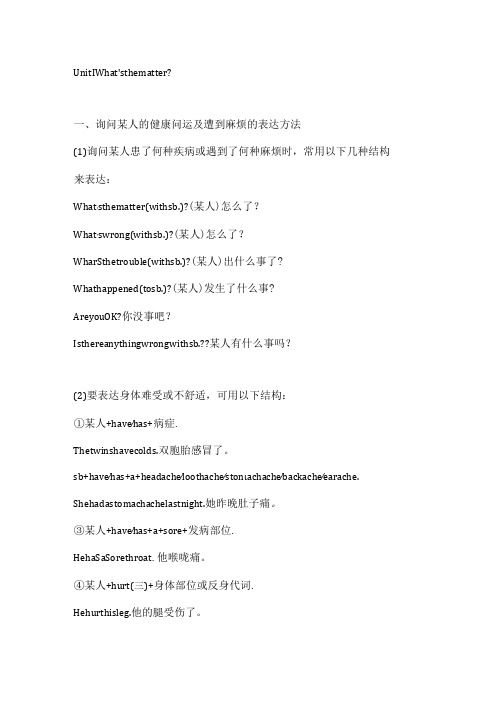
UnitIWhat'sthematter?一、询问某人的健康问运及遭到麻烦的表达方法(1)询问某人患了何种疾病或遇到了何种麻烦时,常用以下几种结构来表达:What,sthematter(withsb.)?(某人)怎么了?What,swrong(withsb.)?(某人)怎么了?WharSthetrouble(withsb.)?(某人)出什么事了?Whathappened(tosb.)?(某人)发生了什么事?AreyouOK?你没事吧?Isthereanythingwrongwithsb.??某人有什么事吗?(2)要表达身体难受或不舒适,可用以下结构:①某人+have∕has+病症.Thetwinshavecolds.双胞胎感冒了。
sb+have∕has+a+headache∕loothache∕stonιachache∕backache∕earache. Shehadastomachachelastnight.她昨晚肚子痛。
③某人+have∕has+a+sore+发病部位.HehaSaSorethroat.他喉咙痛。
④某人+hurt(三)+身体部位或反身代词.Hehurthisleg.他的腿受伤了。
⑤某部位+hurl(三).Myheadhurtsbadly.我头痛得厉害。
⑥某人+have∕has+apain+inone's+身体部位Ihaveapaininmychest.我胸口痛⑦(Thereis)soιnethingwrongwithone's+身体部位. Thereissomethingwrongwithmyrighteye.我的右眼有毛病。
⑧其他表达方式Shehasahearttrouble.她有心脏病。
Hegothitonthehead他头部受到了撞击。
Shecutherfinger.她割破手指了。
二、情态动词should的用法1.ShOIIld为情态动词,意为“应当:应当”,否定式为ShoUkIn'1,其后接动词原形,无人称和数的改变。
Unit1-what's-the-matter-教材语法解析
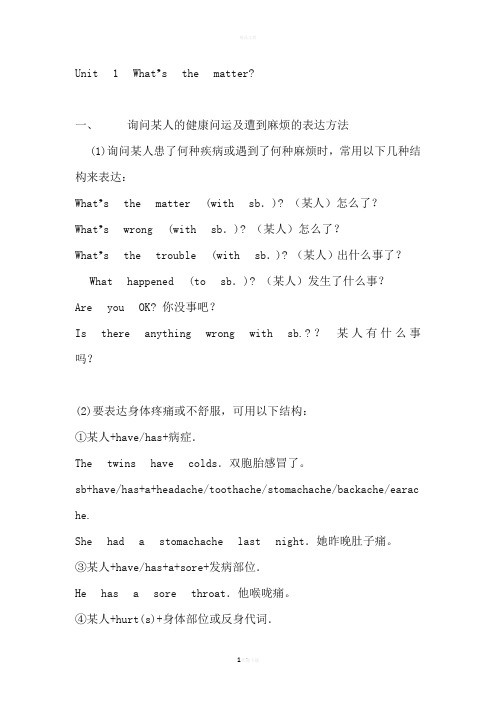
Unit1What’s the matter?一、询问某人的健康问运及遭到麻烦的表达方法(1)询问某人患了何种疾病或遇到了何种麻烦时,常用以下几种结构来表达:What’s the matter(with sb.)? (某人)怎么了?What’s wrong(with sb.)? (某人)怎么了?What’s the trouble(with sb.)? (某人)出什么事了?What happened(to sb.)? (某人)发生了什么事?Are you OK? 你没事吧?Is there anything wrong with sb.??某人有什么事吗?(2)要表达身体疼痛或不舒服,可用以下结构:①某人+have/has+病症.The twins have colds.双胞胎感冒了。
sb+have/has+a+headache/toothache/stomachache/backache/earac he.She had a stomachache last night.她昨晚肚子痛。
③某人+have/has+a+sore+发病部位.He has a sore throat.他喉咙痛。
④某人+hurt(s)+身体部位或反身代词.He hurt his leg.他的腿受伤了。
⑤某部位+hurt(s).My head hurts badly.我头痛得厉害。
⑥某人+have/has +a pain +in one’s+身体部位I have a pain in my chest.我胸口痛⑦(There is)something wrong with one’s+身体部位.There is something wrong with my right eye.我的右眼有毛病。
⑧其他表达方式She has a heart trouble.她有心脏病。
He got hit on the head他头部受到了撞击。
Unit 1 What’s the matter_主要知识点整理
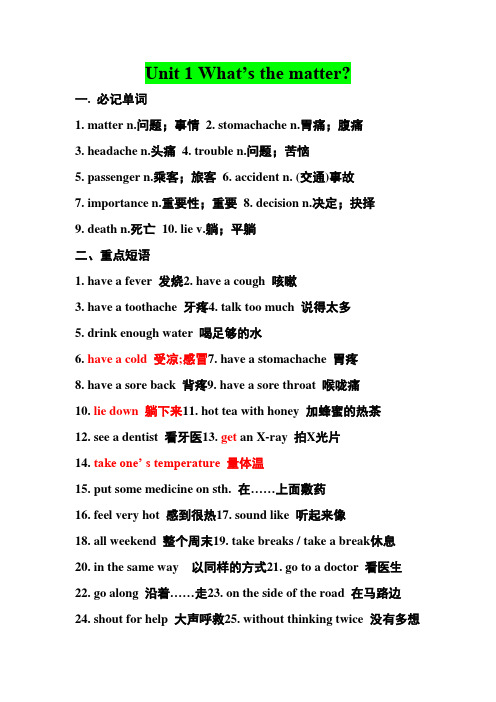
Unit 1 What’s the matter?一. 必记单词1. matter n.问题;事情2. stomachache n.胃痛;腹痛3. headache n.头痛4. trouble n.问题;苦恼5. passenger n.乘客;旅客6. accident n. (交通)事故7. importance n.重要性;重要8. decision n.决定;抉择9. death n.死亡10. lie v.躺;平躺二、重点短语1. have a fever 发烧2. have a cough 咳嗽3. have a toothache 牙疼4. talk too much 说得太多5. drink enough water 喝足够的水6. have a cold 受凉;感冒7. have a stomachache 胃疼8. have a sore back 背疼9. have a sore throat 喉咙痛10. lie down躺下来11. hot tea with honey 加蜂蜜的热茶12. see a dentist 看牙医13. get an X-ray 拍X光片14.take one’ s temperature 量体温15. put some medicine on sth. 在……上面敷药16. feel very hot 感到很热17. sound like 听起来像18. all weekend 整个周末19. take breaks / take a break休息20.in the same way 以同样的方式21. go to a doctor 看医生22. go along 沿着……走23. on the side of the road 在马路边24. shout for help 大声呼救25. without thinking twice 没有多想26. get off 下车27. have a heart problem 有心脏病28. to one’ s surprise 使.......惊讶的29. thanks to 多亏了;由于30. in time 及时31. think about doing 考虑做某事32. save a life 挽救生命33. get into trouble 造成麻烦34. right away 立刻;马上35. because of 由于36. do the right thing做正确的事37. get out of 离开;从……出来38. hurt oneself 受伤39. get hit / sunburned 被打击/晒伤40. put a bandage on sth. 用绷带包扎41. fall down 摔倒42. feel sick 感到恶心43. have a nosebleed 流鼻血44. cut his knee 割伤他的膝盖45. put her head back 把她的头向后仰46. have problem s breathing 呼吸困难47. go mountain climbing 去爬山48. be used to doing sth. 习惯做某事49. run out (of) 用完;用尽50. so that 以便51. so. . . that 如此… …以致于…52. be in control of 掌管;管理53.in a difficult situation 在困境中54. keep on doing sth. 继续或坚持做某事55. make decisions / make a decision 做出决定56. take risks / take a risk冒险57. give up doing 放弃做某事58. agree to do sth. 同意做某事59. cut off 切除60. lose one’s life 失去生命三.经典句型1. What’ s the matter with you?= What’s the trouble with you?= What’ s wrong with you?你怎么了?2. What should she do? 她该怎么办呢?Should I take my temperature? 我应该量一下体温吗?主语+ should/shouldn’t + 动词原形. ..①You should lie down and rest. 你应该躺下休息一会儿。
八下Unit-1-What's-the-matter知识点归纳

八下Unit 1 What’s the matter?一.询问某人患了何种疾病或遇到什么麻烦时,常用以下句型:1.What’s the matter (with sb)?2. What’s the trouble / problem(with sb)?3.What’s wrong (with sb)? 你怎么了?4. What’s one’s trouble / problem ?5.What’s up ?6. What happened to sb ?7.Are you OK ? 8. Is there anything wrong with sb ? 二.表达身体不适或疼痛时,常用以下结构:1.Sb + have /has + a / an + 疾病名称:have a cold(患感冒) / fever / cough / temperature注:have a cold相当于get a cold/catch a cold/have got a cold;have a bad cold(患重感冒);have a heart problem 有心脏病2.Sb + have/ has a sore +身体部位:have a sore throat / back3.Sb + have / has+ a+ 身体部位+ache(构成疾病名词) have a toothache /headache / stomachache / earache /backache4.Sb + hurt(s) +身体部位/ oneself ; He hurt his leg .或身体部位+ hurts ; My head hurts badly .5.There is something wrong with one’s +身体部位。
6.Sb +have /has a pain in one’s +身体部位三.情态动词 should / should’t 的用法:意为’应该,应当’后接动词原形,无人称和数的变化。
Unit 1 What 's the matter 知识点讲解带练习 课件 人教版英语八年级下册
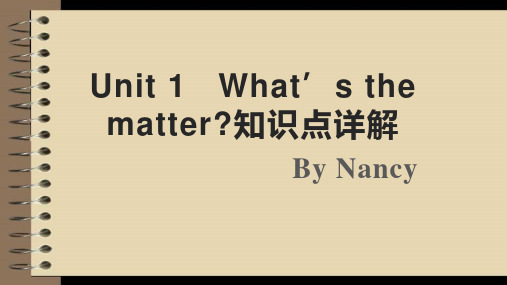
谢谢大家!
三、语法知识
● 1.询问某人的身体状况及遇到麻烦的表达方法 ● What’s the matter (with sb.)?(某人)怎么了? ● What’s wrong (with sb.)? ● What’s the trouble (with sb.)?
●2. 表达身体疼痛或不舒服的句型
● ①某人+have/has+病症/身体部位+ache. ● ②某人+have/has+a+sore+发病部位. ● ③某人+hurt(s)+身体部位或反身代词(oneself). ● ④某部位+hurt(s). ● ⑤There is something wrong with one’s+sb/部位
●
= have difficulty doing
●
= have problems doing
●
●4.反身代词
● 【考点】① 第一人称和第二人称的反身代词 形代+self
●
② 第三人称的但身代词宾格+self
●
③ 常见的搭配
● enjoy oneself=have a good time=have fun玩的开心 ● help yourselves/yourself随便吃;别拘束 ● by oneself= on sb’s own靠某人自己;独立
● (一)单项选择
● 5. The old man is used to __________ tea after he gets up.
● A. drink
B. drinks
C. drinking
D. drank
● 6. Don't forget to take your bag when you________ the bus.
Unit1 What's the matter 短语总结-背诵版

Unit1What's the matter?短语总结—背诵版一、短语总结1.“(某人)怎么了?”表达(3+2+1+1)1.What’s the matter/trouble/problems(with sb.)?2.What’s wrong/up(with sb.)?3.(Is there)anything wrong(with sb.)?4.What happened to sb.?2.happen(意外地)发生(happen-happened-happened)1.take place(有计划地)发生2.take one’s place=take the place of sb.取代/代替某人的位置3.sth.happen(ed)to sb.某事发生在某人身上4.sb.happen(ed)to do sth.某人碰巧做某事3.“身体部位疼痛or不舒服”的表达(4)1.have a+疾病名词(headache/stomachache/toothache/其他疾病)2.have a sore+身体部位3.身体部位+hurt(s)4.have a pain in the+身体部位4.accident1.accidental adj.意外的accidentally adv.意外地2.by accident=accidentally意外地3.by mistake错误地5.lie1.lie in位于......(内部)2.lie to位于......(相隔海/省)3.lie on位于......(接壤)4.Iie ylie躺;位于lie-lay-lain lying lie down躺下lie on/in/to位于撒谎lie-lied-lied lie to sb.对某人撒谎lie about sth.对某事撒谎lay放置;下蛋lay-laid-laid laying lay down放下6.上下车1.get on/off+a/the bus/plane/train/metro/subway2.get in/into/out of+a/the taxi/car/van7.think v.思考;认为(think-thought-thought)1.think about思考;考虑2.think over=think about carefully仔细考虑3.think of认为;想起What do you think of...?=How do you like...?你认为...怎么样?4.think twice再三考虑;谨慎考虑8.surprise n./v.(surprise-surprised-surprised)1.to one’s surprise令某人吃惊的是2.in surprise=surprisingly吃惊地3.be surprised at对......感到吃惊4.be excited about对......感到激动5.be interested in对......感兴趣9.trouble n.麻烦(不可数)1.have trouble/problems/difficulty(in)doing sth.做某事有麻烦/问题/困难2.get into trouble陷入麻烦3.be in trouble在麻烦中10.fall v./n.(秋天)(fall-fell-fallen)1.fall behind sb.落后某人catch up with sb.赶上某人2.fall in love with sb./sth.爱上...../与......相爱3.fall down掉下4.fall over摔跤5.fall down from...=fall off...从......掉下6.fall asleep睡着11.run v.跑/经营(run-ran-run)1.run after...追赶...2.run away逃跑3.sb.run out of sth.某人用光/耗尽某物4.sth.run out某物花光/耗光5.run a shop/company/restaurant经营一家商店/公司/餐馆e n./v.使用(use-used-used)1.be useful=be of use有用的2.be useless=be of no use没有用的3.be used to(doing)sth.习惯于(做)某事4.be used to do sth.被用来做某事ed to do sth.过去常常做某事13.help n./v.帮助(help-helped-helped)1.help(sb.)to do sth.帮助某人做某事2.help sb.with sth.在某方面帮助某人3.can’t help doing sth.情不自禁/忍不住做某事4.help oneself to sth.自便/自取......(随便吃/喝......)5.with one’s help=with the help of sth.在某人的帮助下6.ask sb.for help=turn to sb.向某人寻求帮助14.own adj.自己的v.拥有(own-owned-owned)owner n.拥有者1.sb.own sth.=sb.be the owner of sth.某人拥有某物2.on one’s own=by oneself=alone独自地3.one’s own+n.(单/复)某人自己的......15.mean v.意思是/打算(mean-meant-meant)adj.刻薄的;吝啬的meaning n.意思;意义meaningful adj.有意义的meaningless无意义的1.mean to do sth.打算做某事2.mean doing sth.意味着做某事16.mind v.介意/在意(mind-minded-minded)n.决心;心智;思想;头脑1.make up one’s mind(to do sth.)下定决心(做某事)2.change one’s mind改变某人的主意3.keep......in mind记住......4.lose one’s mind失去理智;发疯5.in one’s mind=in one’s opinion=in one’s view在某人看来6.mind sb./one’s doing sth.介意某人做某事7.Never mind.(用于安慰)没关系;别担心;不要紧17.cut v.切割/砍(cut-cut-cut)1.cut up=cut...into pieces切碎2.cut off切掉3.cut down砍倒4.cut...in half对半切开18.keep v.保持;继续(keep-kept-kept)1.keep doing sth.保持做某事2.keep sb.doing sth.让某人保持做某事3.keep on doing sth.=go on doing sth.继续做某事4.keep/stop sb.from doing sth.阻止某人做某事19.risk(risk-risked-risked)1.be at risk=be in danger有危险的/在危险中2.take a risk=take risks冒险3.take the risk of sth.=be at the risk of sth.冒着......的风险4.risk doing sth.冒险做某事20.expect v.期待(expect-expected-expected)1.expect(sb.)to do sth.期待(某人)做某事2.expect that从句期待+宾语从句21.sick adj.生病的(定语、表语)ill adj.生病的(只作表语)1.sick-sicker-sickest ill-worse-worst2.be sick of sth.厌烦某事3.be tired of sth.厌倦某事22.breath n.呼吸breathe v.呼吸(breathe-breathed-breathed)1.breathe fresh air呼吸新鲜空气2.hold one’s breath屏住呼吸3.take a deep breath深呼吸4.be out of breath上气不接下气23.ready adj.准备好的1.get/be ready to do sth.准备好做某事2.get/be ready for sth.为......做好准备24.其他短语1.be in control of sth.控制/掌管/管理某事2.take one’s temperature量某人的体温3.take the medicine吃药take pills吃药片4.the rest of sth./sb.剩下的某物/某人5.right away=right now=at once立刻;立即;马上6.get out of...从......出来/离开......。
人教八下英语Unit1What’sthematter短语语法知识点汇总
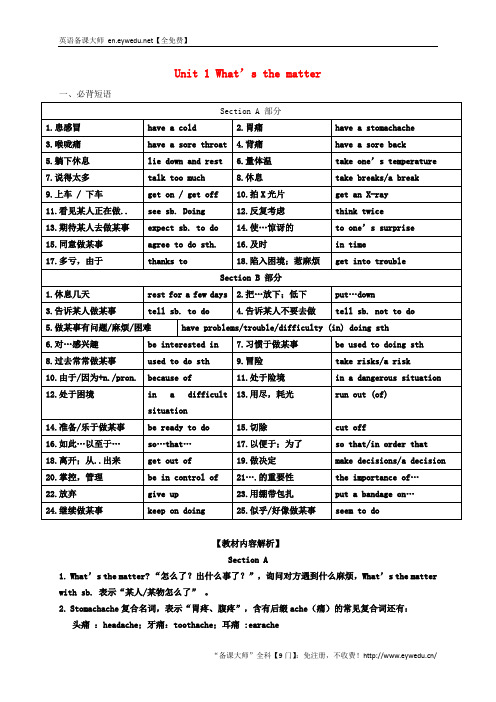
Unit 1 What’s the matter一、必背短语【教材内容解析】Section A1.What’s the matter? “怎么了?出什么事了?”,询问对方遇到什么麻烦,What’s the matter with sb. 表示“某人/某物怎么了”。
2.Stomachache复合名词,表示“胃疼、腹疼”,含有后缀ache(痛)的常见复合词还有:头痛:headache;牙痛:toothache;耳痛 :earache3.sore是形容词,意为“疼痛的,酸痛的”可作定语或表语。
常见短语:喉咙痛:have a sore throat 后背痛:have a sore back4.lie用作动词,可表示“躺”或者“位于”,还可表示“撒谎”。
例:She is lying in bed with a bad cold. 她严重感冒躺在床上。
例:Beijing lies in the north of China. 北京位于中国北部。
例:It is a bad habit to lie. 撒谎是坏习惯。
【拓展】lie及lay一词多义(2). Rest当动词,表示“休息”,rest也可作名词“休息”:have(take) a restBreak 当动词“打破,损坏”,作名词“休息,间歇”(take)have a break/(take)have breaks 5.maybe作副词,表示“可能、也许”,常放在句首,相当于perhaps,可与may be相互转换。
例:Maybe he is a foreigner.=He may be a foreigner.6.need作情态动词时,need do sth;作实义动词时,need to do sth。
7.without用作介词,表示“没有”,后接名词、代词或者动名词,反义词是with。
例:They left without saying goodbye. 他们什么都没说就走了。
unit1What's -the-matter-知识点及短语
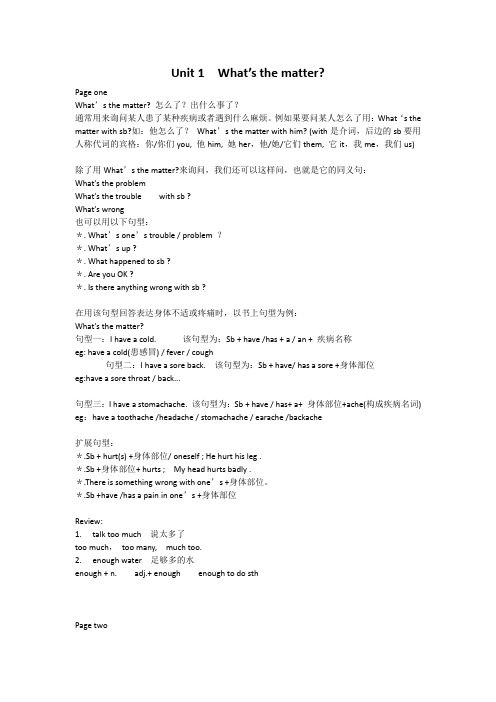
Unit 1 What’s the matter?Page oneWhat’s the matter? 怎么了?出什么事了?通常用来询问某人患了某种疾病或者遇到什么麻烦。
例如果要问某人怎么了用:What‘s the matter with sb?如:他怎么了?What’s the matter with him? (with是介词,后边的sb要用人称代词的宾格:你/你们you, 他him, 她her,他/她/它们them, 它it,我me,我们us)除了用What’s the matter?来询问,我们还可以这样问,也就是它的同义句:What’s the problemWhat’s the trouble with sb ?What’s wrong也可以用以下句型:*. What’s one’s trouble / problem ?*. What’s up ?*. What happened to sb ?*. Are you OK ?*. Is there anything wrong with sb ?在用该句型回答表达身体不适或疼痛时,以书上句型为例:What’s the matter?句型一:I have a cold. 该句型为:Sb + have /has + a / an + 疾病名称eg: have a cold(患感冒) / fever / cough句型二:I have a sore back. 该句型为:Sb + have/ has a sore +身体部位eg:have a sore throat / back...句型三:I have a stomachache. 该句型为:Sb + have / has+ a+ 身体部位+ache(构成疾病名词) eg:have a toothache /headache / stomachache / earache /backache扩展句型:*.Sb + hurt(s) +身体部位/ oneself ; He hurt his leg .*.Sb +身体部位+ hurts ; My head hurts badly .*.There is something wrong with one’s +身体部位。
unit1 what's the matter知识点总结

和
must:强调主观上的必要性,例:I must tidy up the room.我必须把房间弄整洁
agree with:后面接“人”或“意见”,例:I agree witt on the head.某人头部受到撞击。 ①hit为及物动词,意为“打,打击,击中(某人或某物)” 例:The ball hit the window.那个球击中了窗户。 ②hit有时为不及物动词,意为“打击;撞击” 例:The ball hit against the wall.球撞到了墙上。 ③hit为名词,意为“打;打击;成功;红极一时的人物或 事物” 例:She become a hit at that time.他成了那时轰动一时 的人物。 • Someone got hit on the head. get hit 相当于被动结构的be hit,意为“受到打击;被打 击” 常见的类似短语有:get lost迷路;get married结婚;get dressed穿衣服;get sunburned晒伤
• As a mountain climber,Aron is used to taking risks. 作为一名登山者,阿伦习惯于冒险。 • 此处as为介词,意为“作为;当做” • 例:He works in a hotel as a cook. • 此处be used to意为“习惯于……;适应于…….”,后 可接名词、代词或动名词。 • 例:He is used to getting up early.他习惯于早起。 • take risks意为“冒险”,相当于take a risk. • 例:You can’t get rich without taking risks.
unit1what's the matter单元知识总结
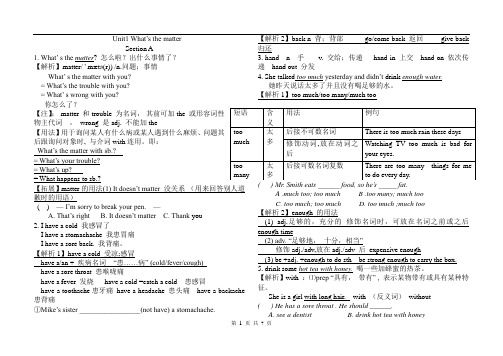
Unit1 What’s the matterSection A1. What’ s the matter? 怎么啦?出什么事情了?【解析】matter/ ' mætə(r)) /n.问题;事情What’ s the matter with you?= What’s the trouble with you?= What’ s wrong with you?你怎么了?【注】:matter 和trouble 为名词,其前可加the 或形容词性物主代词,wrong 是adj. 不能加the【用法】用于询问某人有什么病或某人遇到什么麻烦、问题其后跟询问对象时, 与介词with连用。
即:What’s the matter with sb.?= What’s your trouble?= What’s up?= What happens to sb.?【拓展】matter的用法(1) It doesn’t matter 没关系(用来回答别人道歉时的用语)( ) —I’m sorry to break your pen. —_______A. That’s rightB. It doesn’t matterC. Thank you2. I have a cold 我感冒了I have a stomachache 我患胃痛I have a sore back. 我背痛。
【解析1】have a cold 受凉;感冒have a/an + 疾病名词“患……病” (cold/fever/cough)have a sore throat 患喉咙痛have a fever 发烧have a cold =catch a cold 患感冒have a toothache患牙痛have a headache 患头痛have a backache 患背痛①Mike’s sister _________________(not have) a stomachache.【解析2】back n 背;背部go/come back 返回give back 归还3.hand n 手v. 交给;传递hand in 上交hand on 依次传递hand out 分发4. She talked too much yesterday and didn’t drink enough water.她昨天说话太多了并且没有喝足够的水。
Unit1_What's_the_matter_知识点

Unit 1 What’s the matter?知识点总结1. 某人怎么了?What’s the matter with sb? What’s the trouble with sb? What’s the problem with sb? What’s wrong with sb? What happened with sb? W hat’s up with sb?Is there anything wrong with you?2.(作文素材)health问题和accidents 问题:have a (bad) cold (重)感冒have a toothache牙痛have a fever 发烧have a sore throat 喉咙痛,咽喉痛have a sore back 背痛have a backachehave a headache 头痛have a stomachache 胃痛;肚子痛have a nosebleed 流鼻血I feel sickcut one’s 身体部位hurt one’s 身体部位get hit on the head常见建议:You should:lie down and rest drink some hot tea with honeysee a dentist get an x-raytake one’s temperature take some medicineput some medicine on it put a bandage on ittake sb to the hospital put her head back3.基本知识点1.much too 太too much 太多(不可数)too many 太多(可数)2. enough放在名前后,形副后。
good enough足够好,enough money足够的钱3. lie down躺下,ing形式lyinglie 躺,躺着,过去式lay,lie 撒谎,过去式lied4. fall down 摔倒fall过去式fell feel过去式felt5. maybe 常用于句首,后加句子。
Unit1what’sthematter_SectionA知识点梳理人教版八年级英语下册

人教版八年级下册英语课本知识点梳理Unit 1 wh at’s the matter? sectionA课文内容:What's the matter? 怎么了? (教材第1页)【用法详解】What's the matter? 怎么了?/出什么事了?常用于询问某人患了何种疾病,遇到了什么困难等,也可用于询问某物出了什么故障,其后可接with sb./sth.,表示“某人/某物怎么了?”。
其中matter 用作名词,意为“问题;事情”matter前须加定冠词the。
【例句】What's the matter? 怎么了?Bad luck.I lost my pen. 真倒霉,我弄丢了钢笔.What's the matter with him? 他怎么了?He has a sore back.他背痛【拓展】matter[动词] 要紧;有关系多用在否定句、疑问句或条件句中It doesn't matter.没关系。
(通常用来回答对方的道歉)I have a cold. 我感冒了。
(教材第1页)【用法详解】have a cold (患)感冒。
其中have 用作及物动词,意为“患(病);遭受(病痛)”,常用于结构“have a/an +疾病名称”表示患病或身体某部位不舒服。
此时它不能用于进行时态,其第三人称单数形式为has,过去式为had。
常见的表示病痛的短语还有:have a fever 发烧have a toothache 牙疼have a headache头痛have a cough 咳嗽have a stomachache胃痛Do you often have a cold? 你经常感冒吗?Jim had a stomachache after supper yesterday.吉姆昨天晚饭后胃痛。
l have a stomachache.我胃痛。
( 教材第1 页)【用法详解】stomachache [名词]胃痛;腹痛是由“名词stomach(;腹部)+ache(疼痛)”构成的复合名词。
Unit 1 What’s the matter讲义(带答案)

Unit 1 What’s the matte r?讲义一、重点知识点梳理1. 怎么啦?出什么事情了?【解析】matter/ ' mætə(r)) /n.问题;事情【注】:matter 和trouble 为名词,其前可加the 或形容词性物主代词,wrong 是adj. 不能加the 【同义】遇到麻烦2. I had a cold.我感冒了。
have a cold=catch a cold=have the flu感冒have a fever 发烧have a cough咳嗽have a stomachache胃疼,肚子疼have a toothache牙疼have a headache头疼3. 身体部位+ ache(疼痛)构成新的复合词stomach+ache=stomachache head+ache=headache tooth+ache=toothache back+ache=backache 后背痛ear+ache=earache耳朵痛4. much too+ 形容词,意为太...... ,too much+名词,意为很多,大量。
5. enough【形容、副词】足够的/地,enough放在名前,形副后。
good enough足够好,enough money=much money6. lie down躺下,lie 躺,躺着,现在分词:lying过去式lay;lie说谎,过去式lied7. maybe“或许”,常用于句首,表示可能性,后加句子。
Maybe you are right.may be,是情态动词+be的结构,意为“可能,也许”,后加名词、代词或形容词。
He may be angry. sound like+名词代词和从句:It sounds like you don’t know the truth.It sounds like a good idea. sound+形容词,“听起来,好像”,The music sounds nice.9. need 需要,实义动词need+名词,需要某物;need to do sth.需要做某事,主语通常是人,表示人主动的动作:You need to listen carefully during class.need doing sth.主语通常是物,表示被动的动作:Your dirty clothes need washing.9.Run out &run out ofrun out 的主语一般是sth, 如:His money soon ran out. ran是run的过去式run out of的主语是sb. 如:he ran out of the money.10. I had a cold.我感冒了。
Unit1-What's-the-matter重点知识短语等
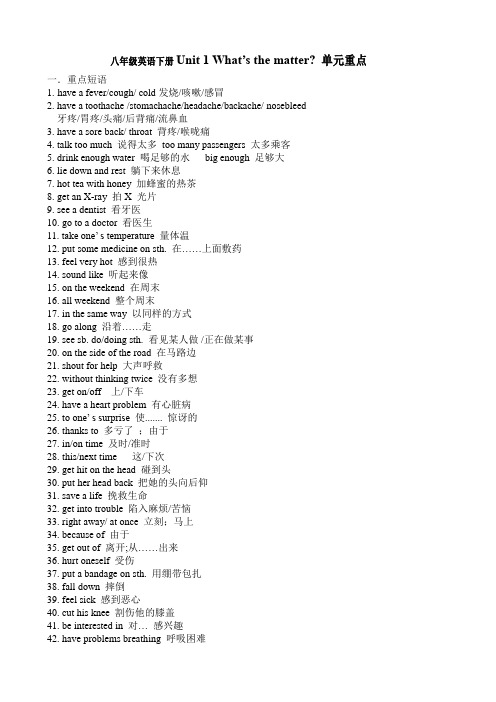
八年级英语下册Unit 1 What’s the matter?单元重点一.重点短语1.have a fever/cough/ cold发烧/咳嗽/感冒2. have a toothache /stomachache/headache/backache/ nosebleed牙疼/胃疼/头痛/后背痛/流鼻血3. have a sore back/ throat 背疼/喉咙痛4. talk too much 说得太多too many passengers 太多乘客5. drink enough water 喝足够的水big enough 足够大6. lie down and rest 躺下来休息7. hot tea with honey 加蜂蜜的热茶8. get an X-ray 拍X 光片9. see a dentist 看牙医10. go to a doctor 看医生11. take one’ s temperature 量体温12. put some medicine on sth. 在……上面敷药13. feel very hot 感到很热14. sound like 听起来像15. on the weekend 在周末16. all weekend 整个周末17. in the same way 以同样的方式18. go along 沿着……走19. see sb. do/doing sth. 看见某人做 /正在做某事20. on the side of the road 在马路边21. shout for help 大声呼救22. without thinking twice 没有多想23. get on/off 上/下车24. have a heart problem 有心脏病25. to one’ s surprise 使....... 惊讶的26. thanks to 多亏了;由于27. in/on time 及时/准时28. this/next time 这/下次29. get hit on the head 碰到头30. put her head back 把她的头向后仰31. save a life 挽救生命32. get into trouble 陷入麻烦/苦恼33. right away/ at once 立刻;马上34. because of 由于35. get out of 离开;从……出来36. hurt oneself 受伤37. put a bandage on sth. 用绷带包扎38. fall down 摔倒39. feel sick 感到恶心40. cut his knee 割伤他的膝盖41. be interested in 对…感兴趣42. have problems breathing 呼吸困难43. mountain climbing 登山运动44. be used to doing sth. 习惯做某事45. run out (of) 用完;用尽46. so that 以便47. so. . . that 如此… …以至于…48. be in control of 掌管;管理49. in a difficult situation 在闲境屮50. keep on doing sth. 继续或坚持做某事51. make a decision 做出决定52. take risks 冒险53. give up 放弃54. act quickly 快速行动二.重点句型(一) 医生询问病情的常用语句:1. What's wrong/the matter (with you)?你怎么了?What's your trouble? 你哪里不舒服?When did it start?从何时开始生病的?2. How are you (feeling) now?你现在觉得怎么样?Are you feeling better today?你今天好些了吗?3. Do you feel tired?你觉得疲劳吗?(二) 病人诉说病情的常用语句:1. I don't feel very well. / I'm not feeling well. 我感到不舒服。
unit1 what's the matter总结
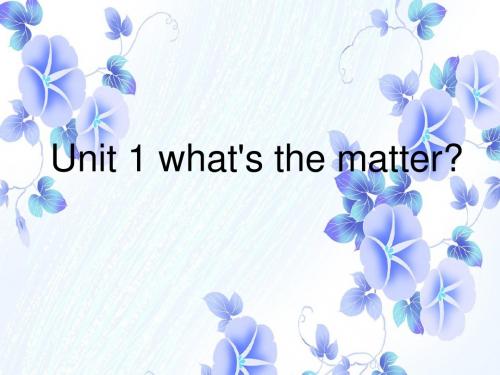
3. What should she do?
她该怎么办呢? Should I take my temperature? 我应该量一下体温吗? should是情态动词,可表示建议,意思是“应当, 应该,最好”,其否定形式是shouldn’t,基本句 型是: 主语+ should/shouldn’t + 动词原形. .. ①You should lie down and rest. 你应该躺下休息一会儿。 ② You shouldn’ t go out at night. 你晚上不应该出去。
2.在英语中,表达“疼痛或不舒服”时的常用结
构: (1)主语+have/has+病症 (2)主语+have/has+a+sore+发病部位 sore 是一个独立的形容词,指的是身体某一部 位的酸痛。如:sore back, sore throat,sore back,sore neck. (3)主语+have/has+a+部位-ache -ache作后缀,常与表示身体部位的名词合成一 个新词,表身体某部位疼痛,如: toothache ,headache , stomachache
23. s h o u t fo r h e lp 大声呼救 24. w ith o u t th in k in g tw ic e 没有多想 25. g e t o ff 下车 26. h a v e a h e a rt p ro b le m 有心脏病 27. to o n e ’ s s u rp ris e 使...惊讶的 28. th a n k s to 多亏了 ;由于 29. in tim e 及时 30. s a v e a life 挽救生命 31. g e t in to tro u b le 造成麻烦 32. rig h t a w a y 立刻;马上 33. b e c a u s e o f 由于
- 1、下载文档前请自行甄别文档内容的完整性,平台不提供额外的编辑、内容补充、找答案等附加服务。
- 2、"仅部分预览"的文档,不可在线预览部分如存在完整性等问题,可反馈申请退款(可完整预览的文档不适用该条件!)。
- 3、如文档侵犯您的权益,请联系客服反馈,我们会尽快为您处理(人工客服工作时间:9:00-18:30)。
Unit1 W hat’s the matter? 知识点总结一、基本知识点1. What’s the matter (with you)? 怎么了?出什么事了?What’s the trouble/ the problem / wrong with sb./ sth.?2. I had a cold.我感冒了。
have a cold=catch a cold=have the fluhave a (high)fever发烧have a cough咳嗽have a stomachache胃疼,肚子疼have a toothache牙疼have a headache头疼3. 身体部位+ache(疼痛)构成新的复合词stomach+ache=stomachache胃痛head+ache=headache头痛tooth+ache=toothache牙痛back+ache=backache后背痛4. much too+ 形容词,意为:“太……”too much+ 不可数名词,意为:“太多……”5. enough【形容、副词】足够的/地,enough放在名前后,形副后。
good enough足够好,enough money=money money6. lie down躺下,lie 躺,躺着,过去式(lay);lie说谎,过去式(lied)7. maybe “或许”,常用于句首,表示可能性,后加句子。
Maybe you are right.may be,是情态动词+be的结构,意为“可能,也许”,后加名词、代词或形容词。
He may be angry.8. sound like+名词、代词和从句:It sounds like you don’t know the truth.It sounds like a good idea.sound+形容词,“听起来,好像”:The music sounds nice.9. need 需要,实义动词need+名词,需要某物;need to do sth.需要做某事,主语通常是人,表示人主动的动作:You need to listen carefully during class.need doing sth.主语通常是物,表示被动的动作:Your dirty clothes need washing.10. get off (the bus) 下(公交车)get on 上车11. agree 同意,赞同;Agree to do sth.同意做某事,Agree with sb.同意某人的看法、观点Agree on sth.在某方面达成一致。
12. trouble问题,麻烦;(不可数)be in trouble 陷入麻烦make trouble制造麻烦have trouble (in) doing sth.=have difficulties (in) doing sth.13. right away=right now=at once,意为“立刻,马上”。
14.【复习】advice [不可数名词]劝告,建议,向…征求意见ask for one’s advicea piece of (good/sound/ proper/ bad/improper) advice一条(好的/合理的/正确的/坏的/不合理的)建议give/offer sb. advice on sth.就某事给某人建议;take one’s advice.接受、采纳某人的建议advise [动词] advise sb. to do sth.advise sb. doing sth15. 【复习】exercise 动词意为“锻炼、训练”,可数时意为“演习、练习、训练”,不可数时意为“锻炼”。
16. hurt 及物动词,使……疼痛,……受伤,He hurt his leg while exercising.不及物动词,……(部位)疼。
His leg hurt badly.17. clean 【动词】打扫,清理clean the classroom ,【形容词】清洁的、干净的、清白的,a clean and tidy room.cleaner意为清洁工、清洁剂。
18. hit (用手或器具)打;击打The boy hit the dog with a stone.hit sb. on the head/ nose/ back打某人的头、鼻子、后背,(on用在所打较硬的部位);hit sb. in the face/ eye/ stomach 打某人的脸、眼睛、肚子,(in用在所打较软的部位)。
19. beused to sth./ doing sth.“习惯于、适应于做某事”,(强调状态)。
His grandpa was used to country life.Mary is not used to getting up early in the morning.get/ become used to sth./ doing sth. “变得习惯,逐渐适应……”(强调过程、动作):It’s difficult for one to get used to another country’s habit.20. 【复习】free [形容词]空闲的free time;免费的the drink is for free;自由的I want to become a free bird.free【动词】使……解脱,得到自由He could not free his arm.21. run out用完,用尽When his water run out, he knew that he would have to do something to save his own life.sth. run out. 某物用尽了。
sb. run out ofsth..人用尽了某物。
He run out of all his money last night.22. risk (sb.) to do sth. 冒险去做某事take a risk=take risks 冒险23. the importance of (doing) sth.(做)某事的重要性We students should know the importance of (learning) English.importance n. 重要(性),important adj.重要的,unimportant adj. 不重要的24. decision 【名词】决定;抉择;make a decisionmake a decision to do sth.25 be in control of.掌控、管理be in the control of …在……的掌控、管理之下The headmaster is in( the) control of this new school.be out of control无法控制,无法管理be under control被控制住,在控制之中26. 【复习】mind意为“介意、在乎”mind doing sth. 介意做某事。
Would you mind one’s doing sth?你介意某人做某事吗?Would you mind my opening the window?27. give up (doing) sth. 放弃(做)某事,give up (playing) computer games;give up后可接名词、代词和动词ing形式,也可不接,如Never give up easily.二、重要短语1. have a cold2. have a stomachache3. see sb. do sth.4. shout for help5. expect (sb.) to do sth.6. to one’s surprise7. thanks to …8. think about…9. be interested in sth.10. lose one’s life11. save one’s life12. take a risk=take risks13. cut off14. keep on doing sth.三、重点语法【反身代词】英语中共有八个反身代词,在使用时应注意和它所指的相应的对象在人称、性别、数上保持一致。
【用法】1.可用作宾语,指的是宾语和主语表示同一个或同一些的人或事物。
如:Maria bought herself a scarf.We must look after ourselves very well.2.可用作表语,指的是表语和主语表示同一个或同一些人或事物。
如:She isnt quite herself today.3.可用作主语或宾语的同位语,常用来加强语气。
如:She herself will fly to London tomorrow.I met the writer himself last week.4.用在某些固定短语当中。
如:look after oneself / take care of oneself 照顾自己teach oneself sth. / learn sth. by oneself自学enjoy oneself 玩得高兴,过得愉快help oneself to sth 请自用……(随便吃/喝些……)hurt oneself摔伤自己say to oneself自言自语leave sb. by oneself把某人单独留下=leave sb. Alonebuy oneself sth.给自己买……东西introduce oneself 介绍……自己【提醒】1.反身代词不能单独做主语,但可以做主语的同位语,起强调作用。
如:我自己能完成作业。
(误)Myself can finish my homework.(正) I myself can finish my homework. / I can finish my homework myself.2. 反身代词表示某人自己不能表示某人的东西,因为它没有所有格的形式。
表达某人自己的(东西)”时,须要用ones own. 如:我用我自己的蜡笔画画。
(误)I’m drawing with myself crayons.(正) I’m drawing with my own crayons.【练习】1. My classmate, Li Ming, made a card for _________ just now.2. Bad luck! I cut _________ with a knife yesterday.3. They tell us they can look after_________ very well.4. My cat can find food by_________ .5. Help __________to some beef, boys.6. Jenny enjoyed_________ in the park yesterday afternoon.7. We can finish our homework by_________ .8. The blind girl lost_________ in the beautiful music.9. Xiao Hui, can you introduce _________ to us ?10. Bill wants to teach_________ French from now on.。
